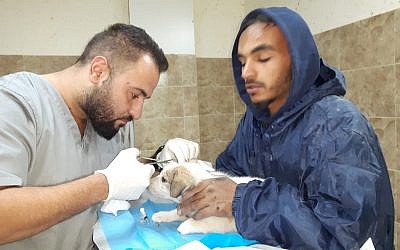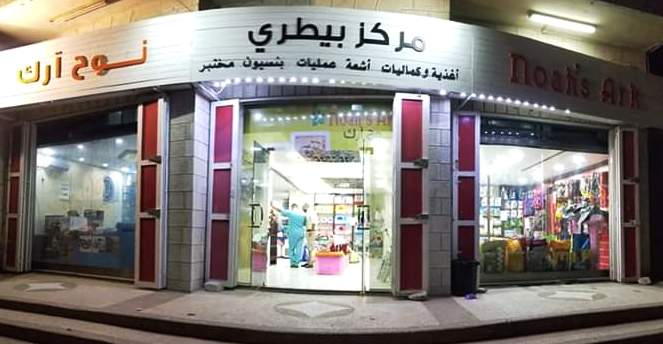Ahmad and his nephew Tarek, both Palestinian Bedouins, were working on the garbage dump in the Palestinian town 'Anata, when they heard the noise of an animal in distress. Digging through the garbage, they found a puppy, bleeding heavily from its leg. They took it to Dr. Mamoon, the vet, who told them it needs surgery. It got out of surgery with one foot less.
A day or two later I got acquainted with Doggy, as I named him. Doggy was the cutest little dog I had ever met. I went to the animal shop, Noah's Ark, in 'Anata, where the salesperson happened to be the vet who had done the surgery, and bought food for small dogs. Doggy was able to drink milk, but so young that he still had to learn how to eat. Getting him to swallow his medication was quite an endeavor. He looked very sad and could barely walk, but seemed happy with any attention. Ahmad found a huge plush dog and Doggy readily adopted it as his surrogate mother. He would crawl over his doll, or hide under its large ears or legs, and didn’t seem to care that it wasn’t alive.
For me, it was love at first sight. I learned on Youtube about dog training, and then exercised with Doggy, so that he would get acquainted with his name, come to me, or stay put. I went to visit him every couple of days and convinced myself that the lessons worked, but perhaps they really did. Even though it was Ahmad who brought him in, now he found that this dog needed too much attention. Ahmad wanted me to take Doggy home. Considering that my apartment is small and includes my clinic, I objected.
It is true that Doggy would pee and poop around, despite my attempt to toilet train him, but I had not expected opposition, which was in striking difference with the attitude to Anthar, the house cat. Ahmad was concerned over the fact that the dog's behavior highly disturbed the workers at the dump, whereas I had not realized that in Arab culture dogs are considered unclean. Now I know this stems from ancient times, when dogs were considered ritually impure and allowed only for work, whereas the prophet Mohammed himself had a cat.
Then, Ahmad built a small home for the dog just outside his terrain, but I felt bad about it and brought him back. We got into fights. At some point, Ahmad had enough of it and gave him away to our mutual friend Ali, the one with the four daughters, who now also has a son. When I found out, I got terribly angry and made them cancel the deal, simultaneously feeling uncomfortable about being in competition with Ali's toddler over a pet.
Anthar and Doggy: Getting to know each other
Little Story: It wasn't just people who despised Doggy. Although my baby dog did his best in being friendly, Anthar the cat did not enjoy his new brother at all. In the beginning, Anthar kept far from this smelly monster and even wouldn't touch his own food, if Doggy happened to be around. I tried to make them work on their relationship, and put Doggy in one hand and cat goodies in the other, but Anthar wouldn't come close. In the second stage, Anthar would allow the dog to get closer, but would hit him in the face, when he came nearby. Eventually, Anthar developed some form of tolerance.
Doggy’s leg was healing and he started to follow me on my path; at least that’s what he tried. First, he made it only for a few meters, but then, he managed to make short walks. Eventually I had to pick him up, because he would get exhausted. I felt sorry, and searched on the internet whether something could be done regarding his foot. I found some places in the USA that make protheses, but nothing here in the country.
All seemed fine, but then my little Palestinian garbage dog got too close to another dog, who just had given birth to ten puppies. (It’s difficult to believe that a mother can divide her time between so many children, but that’s what she did.) Doggy was either simply interested, or looking for his biological mother and approached her. She got defensive and bit him badly in the head. Initially, Doggy seemed to recuperate, but the next day something looked wrong.

Dr. Mamoon & Tarek taking care of Doggy, Nov. 2018

Noah's Ark, Animal hospital and shop, Al-Ram
Late at night, Tarek and I went to Noah's Ark in the Palestinian town Al-Ram, just outside the municipal border of Jerusalem, which is not just an animal shop, but an animal hospital as well. The hospital is a short drive from my home, but it took much longer, since the separation wall between Jerusalem and Al-Ram forced us to make a detour. I had never been in such a place. I was amazed to see the modern machinery, as in a hospital for humans. Moreover, I was astonished that there is a hospital for animals in this environment, situated adjacent to the symbol of oppression, the wall. I anxiously awaited the result of the x-ray. Dr. Mamoon, who works in both 'Anata and Al-Ram, informed us that Doggy’s skull was broken, but his brain seemed intact. I was both in shock and relieved.
Additional antibiotics and a cream for his wounds, and Doggy got over it. But then again he started to feel bad and stopped eating. Back to the vet, who believed this time it was a virus. Vitamins and more medication, three times a day, and Ahmad, who was the one doing most of the caretaking, experienced it more and more as a burden. Doggy’s state went up and down; good and bad days alternated.
I went to a three day conference, and though I was the one in charge of the conference, my mind wandered to my sick friend, who did not get better. The day before my return, Ahmad told me that Doggy was gone; gone in the sense of ‘disappeared’. He had searched everywhere but didn't find the dog and was sure he is dead.

Little Palestinian garbage dog z"l
I found it difficult to believe him. Would Ahmad have killed Doggy out of mercy or anger? Would he have given Doggy to someone else to take better care? I asked one of the workers and he too said that Doggy had disappeared. I was filled with feelings of doubt, guilt and anger. Then sadness started and I cried every night. It surprised me that within just over a month, I became so attached to this little animal. I went through a process of grief, being reminded of him every time I went to visit Ahmad, recollecting emotional instances with him, the visits to the vet, the wagging of his tail when he saw me and his falling asleep on my chest.
It was a challenge to tell my Jewish Israeli friends that I’m sad, because I miss my little Palestinian garbage dog, but they turned out more supportive than I expected. In contrast, most of my Palestinian friends couldn't quite get it. Some suggested - too early - that I simply take another dog. I understood that I cannot keep talking about a dog, when many of them have much bigger losses to deal with. Yasser’s barbershop was recently destroyed by Israeli authorities. Mohammed’s house was accidentally burned to the ground. Mahmood, who I owe a blog post, cannot afford medical treatment for his ill wife. And Ahmad is still fighting with his wife over their kids.
In the meantime I'm getting used to life without Doggy, but for sure this was one more confrontation with the fact that some - animals as well as people - are less fortunate in life than others.
This post was originally published in my blog at the Times of Israel .

No comments:
Post a Comment